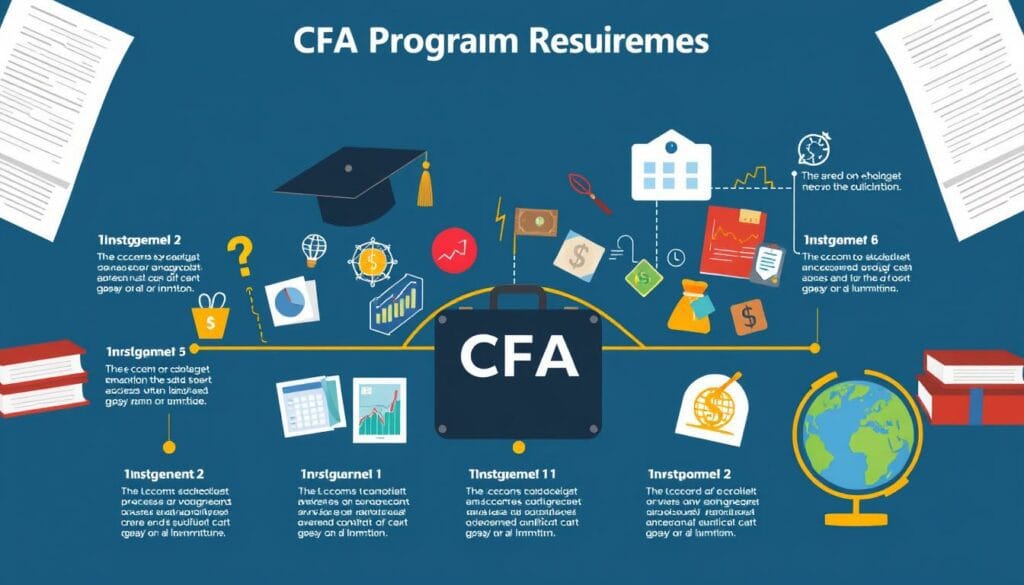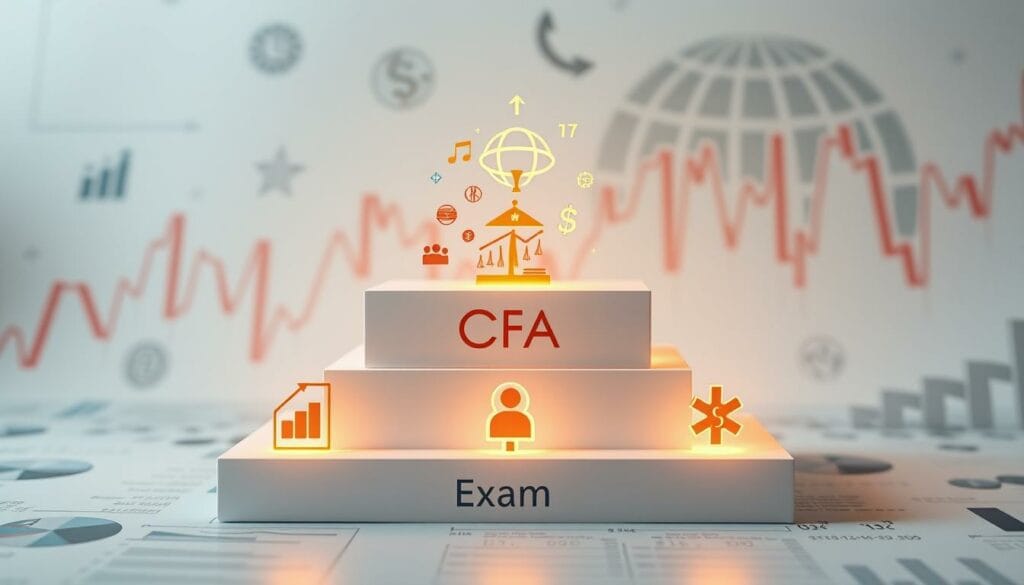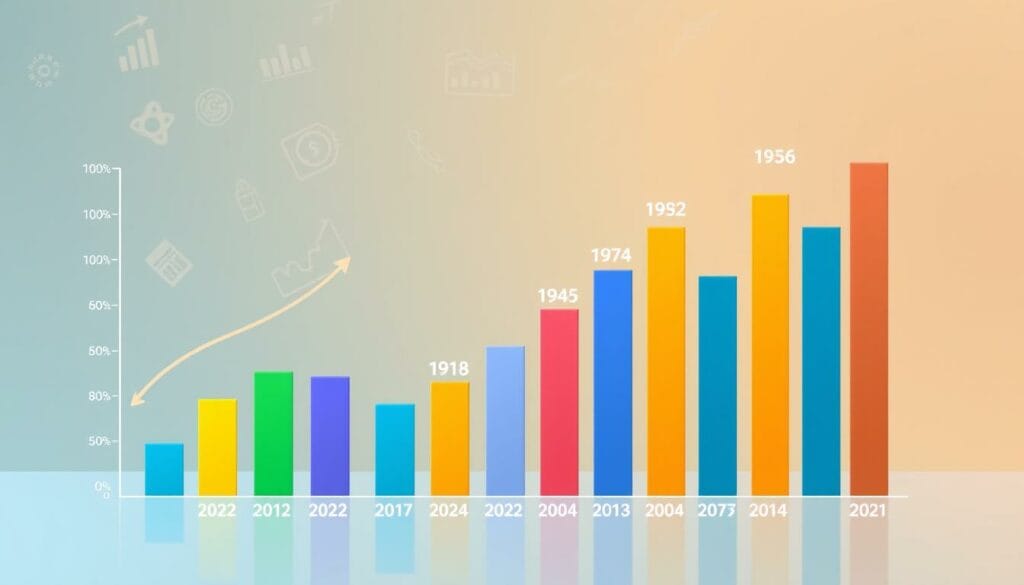Become a Chartered Financial Analyst: Your Path

Table of Contents
Starting your journey to become a Chartered Financial Analyst (CFA) opens doors in the investment and finance world. This guide will help you get the CFA charter step by step. It covers education, exams, prep, and career paths for CFA charterholders. It’s perfect for finance students, professionals, or those moving into investment management.
Key Takeaways
- The CFA Program has three tough exams to get the CFA charter1.
- You need at least 4,000 hours of work or higher education over three years for the CFA Program1.
- The CFA exams are in English, so you must be good at reading and financial analysis1.
- CFA charterholders make 57% more than those without it2.
- The pass rate for the CFA exam is between 38% and 52%, averaging 52% over the last 10 years3.
What is a Chartered Financial Analyst?
A Chartered Financial Analyst (CFA) is a top professional title given by the CFA Institute. Those with the CFA charter show they know a lot about investing, managing money, and planning for wealth4. Today, there are over 190,000 CFAs worldwide, and their numbers are growing by 6% every year since 20124.
Definition and Overview
Having the CFA charter means you really get financial markets, investment tools, and the ethics of the job4. It usually takes about four years to get this charter4.
Roles and Responsibilities
CFA experts often work as investment analysts, portfolio managers, financial advisors, and risk managers4. They give key advice and strategies to help clients meet their financial goals4. Big companies like JPMorgan Chase, UBS, Royal Bank of Canada, and Bank of America hire many CFAs4.
Here are the top areas where CFA charter-holders work:
- Portfolio Management: 25%4
- Research: 12%4
- Consulting: 10%4
- Chief-level Executive: 9%4
- Investment Strategy: 7%4
- Risk Management: 7%4
- Wealth Management: 5%4
- Credit Analysis: 5%4
- Trading: 4%4
- Accounting/Audit: 4%4
- Financial Planning: 3%4
- Others: 9%4
The CFA program covers ethics, math, economics, and more4. It also includes new topics like artificial intelligence and mining data4.
“The CFA designation is considered the gold standard for professional development in investment management.”5
Why Pursue the CFA Charter?
Getting the Chartered Financial Analyst (CFA) charter can change your career path. It brings big benefits like moving up in your job and earning more. This charter is known worldwide, showing you’re an expert in investment management6.
Career Advancement and Higher Earning Potential
People with the CFA charter usually earn more than those without it, making about 57% more on average7. Employers in the investment world really value this credential. It shows you know a lot about investing, managing money, and planning for wealth6. You can get top jobs like research analysts, portfolio managers, and risk managers in many fields6.
The CFA Institute says jobs with a CFA charter can pay from $100,000 for credit analysts to $177,000 for portfolio managers8. Also, those who passed the CFA Level 1 exam in 2023 saw their salaries go up by about 29%8.
Getting the CFA charter opens doors to more career chances and helps you earn more. It’s a smart move for your career growth687.
Educational Requirements for the CFA Program
To join the CFA program, you need to meet certain educational standards. You must have a bachelor’s degree. Or, you can be close to finishing your degree or have a mix of work and education experience9.
All candidates must have a valid international passport and speak English well9. This is especially true for Level 3, which has an essay part9.
Bachelor’s Degree
You need a bachelor’s degree to take the Level I CFA exam10.
Undergraduate Student
If you’re almost done with your bachelor’s degree, you can take the CFA exams too9.
Professional Work Experience
Having four years of full-time work experience helps meet the exam requirements10. You also need at least 4,000 hours of work in the last 36 months9.
The CFA Institute offers tools like practice questions and FAQs to help you prepare9.

“To enroll in the CFA Program and sit for the CFA exams, you must meet one of the following educational requirements: hold a bachelor’s degree, be within 23 months of completing a bachelor’s degree, or have a combination of 4,000 hours of professional work experience and/or higher education over a minimum of 36 months.”
Professional Experience Requirements
To become a Chartered Financial Analyst (CFA), you need more than just school grades. You must have at least 4,000 hours of work experience over 36 months1112. This experience should be about making investment decisions or creating work that helps with those decisions12.
The CFA Institute lets you work full-time, part-time, or remotely as long as you meet the hour and time needs12. You can get this experience before, during, or after taking the CFA exams12.
The CFA Institute has a tool to check if your job counts towards the experience11. It looks at things like making investment decisions, financial analysis, and more11. If your job doesn’t fit the bill, you can look into affiliate membership to get benefits while you gain the needed experience11.
It’s important to show your work experience clearly when applying for CFA membership. You’ll need to give job details, titles, and how your job fits the CFA Institute’s rules12.
“The work experience must be directly linked to the investment decision-making process or must contribute to the development of work products supporting this process.”12
Meeting these work experience needs helps you move closer to becoming a Chartered Financial Analyst. It sets you up for success in the tough investment management and financial analysis fields.
The CFA Exam Structure
The Chartered Financial Analyst (CFA) Program is a tough three-level exam. It tests candidates’ knowledge and skills in investment analysis, portfolio management, and wealth planning. Each level of the CFA exam checks if candidates can use investment concepts and analytical techniques in real situations.
CFA Level I
The CFA Level I exam has 180 multiple-choice questions over two 135-minute sessions13. Candidates usually study over 300 hours for each level13. The exam covers many topics, like Ethics, Quantitative Methods, Economics, and more13. Candidates get practice questions and study resources when they sign up for the exam13.
CFA Level II
The CFA Level II exam has 88 multiple-choice questions in 22 item sets14. It lasts 4 hours and 24 minutes, split into two sessions14. Candidates usually study over 300 hours for this level14. The exam questions are based on International Financial Reporting Standards (IFRS) and don’t penalize for wrong answers14.
CFA Level III
The CFA Level III exam tests candidates with 44 multiple-choice questions and 11 essay questions13. It checks their ability to apply their knowledge to real-world scenarios. Successful candidates often study over 300 hours for this level13. About half pass on their first try, and a quarter try four times13.

“The CFA Program is designed to provide a strong foundation in investment analysis and portfolio management, equipping candidates with the knowledge and skills to excel in the financial industry.”
The CFA exam structure is set up to test candidates’ skills in real-world scenarios. It’s a highly respected and valuable designation in the financial industry1314.
Scoring and Pass Rates
The Chartered Financial Analyst (CFA) exams are graded on a pass/fail basis. Candidates must meet the Minimum Passing Score (MPS) set by the CFA Institute to pass each level15. The CFA Institute doesn’t share numerical scores. Instead, it provides an exam report showing how the candidate did on each section15.
Pass rates for the CFA exams have changed over time. Level 1 is about 37%, Level 2 is around 45%, and Level 3 is about 52%15. But, during the COVID outbreak from 2020 to 2022, pass rates hit lows. Level 1 was at 22%, Level 2 was at 29%, and Level 3 was at 42% for some months15.
The CFA Institute uses the Modified Angoff Method to set the MPS for each exam, which is different from traditional grading15. They also use equating to adjust the MPS based on the question difficulty for each candidate15. Ethical adjustment is key in deciding if a candidate passes or fails the CFA exam15.
To pass the CFA exams, candidates should aim for at least 70% on mock exams and focus on the ethics topic15.
| CFA Exam Level | Pass Rates |
|---|---|
| Level I | |
| Level II | |
| Level III |
The CFA exams started in 1963. Results take 5-8 weeks to come out after the exam window closes16. Pass lists are shared with societies for membership, but individual results are kept secret16.

“Candidates are advised to target a score of at least 70% on mock exams and prioritize the ethics topic to increase their chances of passing the CFA exams.”
Registering for the CFA Exam
Aspiring Chartered Financial Analysts (CFAs) must carefully follow the registration process to get into the CFA exam. The CFA Institute, a global group of investment pros, offers the CFA Program in four exam windows a year: February, May, August, and November17.
Exam Windows and Fees
Candidates can register for the CFA exam early to get a discounted fee or during the standard period. For the August 2024 exam, early registration is from November 14, 2023, to January 23, 2024, costing $940. The standard period is from January 24, 2024, to May 14, 2024, costing $1,25017.
The November 2024 exam’s early period is from February 8, 2024, to April 16, 2024, costing $940. The standard period is from April 17, 2024, to August 7, 2024, costing $1,25017.
For the February 2025 exam, early registration is from May 9, 2024, to July 9, 2024, costing $990. The standard period is from July 10, 2024, to November 7, 2024, costing $1,29017.
There’s also a one-time enrollment fee of $350 for first-time candidates17. If you need to reschedule, there’s an extra $250 fee17.
The total cost of the CFA Program, including all three exams, can be between $3,170 and $4,100, not counting study materials18.
The CFA Institute only accepts online registrations for the CFA Program, not by mail19.
| Exam Window | Early Registration Period | Early Registration Fee | Standard Registration Period | Standard Registration Fee |
|---|---|---|---|---|
| August 2024 | November 14, 2023 – January 23, 2024 | $940 | January 24, 2024 – May 14, 2024 | $1,250 |
| November 2024 | February 8, 2024 – April 16, 2024 | $940 | April 17, 2024 – August 7, 2024 | $1,250 |
| February 2025 | May 9, 2024 – July 9, 2024 | $990 | July 10, 2024 – November 7, 2024 | $1,290 |

Preparing for the Chartered Financial Analyst Exam
Aspiring Chartered Financial Analysts (CFAs) need to put in a lot of time and effort to pass the CFA exams. The CFA Institute says you should study for at least 300 hours per level2021. This ensures you’re well-prepared for the tough exam.

Good prep involves practicing with exams, knowing your strengths and weaknesses, and using the CFA Institute’s Learning Ecosystem. This includes official materials, study sessions, and custom plans.
CFA Study Resources
Aside from the CFA Institute’s stuff, candidates can boost their exam success with third-party prep tools. The CFA Program Practice Pack20 is a great example. These tools offer extra insights, practice questions, and tailored advice to improve your study plan.
To do well, CFA candidates should focus their study time on the exam topics’ weights. For instance, spend about 20 days on Ethical and Professional Standards, which are 15%-20% of the exam. And 12 days each on Quantitative Methods and Economics, which are 8%-12%21.
It’s smart to practice exam conditions at home with a mock test. Take two 2.25-hour sessions with a break, just like the real exam21. This helps you manage your time better and spot areas needing more work.
Successful CFA candidates know how crucial a solid study plan and good time management are. By using the CFA Institute’s resources and extra materials, you can boost your chances of passing the exams and reaching your career goals22.
Maintaining the CFA Charter
To keep the CFA charter, you must stay a member of the CFA Institute every year23. This lets you use the CFA title, get to the Institute’s resources, and join in on networking and learning23.
Also, CFA charterholders must follow the CFA Institute’s strict Code of Ethics and Standards of Professional Conduct23. This rule keeps the CFA’s name high and respected worldwide, showing you’re a top finance and investment pro23.
| CFA Credential Maintenance | Requirements |
|---|---|
| CFA Charterholder Status |
|
| CFA Program Candidate Status |
|
To keep the CFA charter’s high status, charterholders must keep up with their professional growth and ethics23. Keeping to these standards is key to keeping the CFA and getting the most out of it in your finance career23.

“Holding the CFA charter shows you’re serious about ethics and top-level work in investment management.”
Career Paths for Chartered Financial Analysts
The CFA charter opens up many career paths in the investment and finance world24. Those with the CFA charter are in high demand for jobs in investment management, financial analysis, and portfolio management. Their skills in investment research, valuation, and strategic decision-making are very valuable25.
Investment Management
CFA charterholders work as investment managers. They create and manage investment portfolios for their clients’ financial goals and risk levels24. They earn a median total compensation of $177,000, with a base salary of $126,000 USD24.
They analyze market trends, research securities deeply, and make strategic investment choices to improve portfolio performance.
Financial Analysis
Financial analysts with the CFA charter provide deep financial insights and advice for investment decisions25. In the U.S., they earn an average median pay of $99,890, says the U.S. Bureau of Labor Statistics25. They look at financial data, assess risks, and offer strategic advice to help make smart investment choices.
Portfolio Management
CFA charterholders are great at managing portfolios. They handle the building and active management of investment portfolios24. They earn a median total compensation of $177,000, with a base salary of $126,000 USD24.
They use their knowledge in investment analysis, asset allocation, and risk management to create and keep portfolios that meet their clients’ financial goals.
The CFA charter is highly valued by employers in finance and investment24. CFA charterholders work at big names like JPMorgan Chase, Morgan Stanley Wealth Management, BlackRock, and others24. The CFA designation is seen as equal to a US Master’s degree or UK RQF Level 7, adding to its value24.
The Value of the CFA Designation
The Chartered Financial Analyst (CFA) designation is highly valued by employers and clients in the investment management industry. CFA charterholders are known for their deep knowledge, high ethical standards, and dedication to their field26. The CFA Institute says the CFA credential is the top choice for over 31,000 investment firms worldwide26.
CFA charterholders make about 57% more money than those without the charter26. On average, a chartered financial analyst earns $97,591, with salaries ranging from $64,000 to $176,00026. In 2019, CFA salaries went up more than the general market average26.
Having the CFA designation means joining a global network of investment pros, getting ongoing learning chances, and showing your skills to employers and clients27. CFA holders can get bonuses, work with high-net-worth clients, and explore roles in alternative investments and entrepreneurship27.
| Certification | Total Cost | Completion Time | Primary Focus |
|---|---|---|---|
| CFA | $3,000 to $6,000 | 2-4 years | Investment Management |
| FRM | $1,050 to $1,500 | 1-2 years | Risk Management |
| CAIA | $3,000 to $3,500 | 1-2 years | Alternative Investments |
| MBA | $50,000 to $200,000+ | 2 years | General Business |
Getting the CFA charter requires a big investment of time and money, but the rewards can be huge28. Candidates should think about the costs, what they could be giving up, and the return on their investment before choosing to get the CFA designation28.
“The CFA charter is the gold standard for investment professionals, signifying a commitment to ethics, expertise, and excellence in the industry.”
The CFA designation is a top credential that can lead to great career opportunities and show a deep grasp of finance and investment management262728.
CFA Institute Membership Benefits
Being a CFA charterholder or candidate gives you access to many resources for your career growth29. You can use over 22,000 business and finance books, articles, podcasts, and videos from getAbstract29. Plus, you get special career services and resources only for members29.
The CFA Institute connects over 190,000 members in more than 160 markets worldwide30. Being a member means you get access to valuable career tools like job boards and career coaching29. You also get to network with other investment pros through 150+ local societies30.
CFA Institute members enjoy professional learning chances, like continuing education programs29. These help keep your knowledge and skills sharp29. You also get tools like CV builders, interview simulators, and assessments29 to stay ahead in the investment world29.
Joining the CFA Institute means you’re part of a community that values ethics and professionalism30. A big 85% of CFA Program candidates say membership has met or gone beyond their expectations31. This shows the CFA Institute membership is key for those wanting to grow their careers and make a difference31.
If you’re a CFA charterholder or a candidate, the CFA Institute membership has a lot to offer29. You get top-notch resources29, chances to network30, and programs for professional growth29. This membership is a powerful tool for your career29.
Getting Started on Your CFA Journey
If you want to become a Chartered Financial Analyst (CFA), start by signing up for the CFA Program and registering for the Level I exam32. This program has three levels – Level I, Level II, and Level III – that you must pass to get the CFA charter32.
You must meet certain education and work requirements set by the CFA Institute32. You need a bachelor’s degree and 4,000 hours of work experience in investment decision-making32. After checking your eligibility, you can register for the CFA exam and pay the fees32.
The CFA Institute offers many study materials and resources to help you prepare for the exams32. They suggest studying for at least 300 hours for each exam level. This ensures you’re ready for the tough curriculum32.
Enrolling in the CFA program and registering for exams sets you up for success in investment management32. The CFA designation is highly respected worldwide, offering new career chances and higher pay33. With hard work and determination, you can become a CFA charterholder and advance your career.
“The CFA program is a game-changer for professionals in the investment management industry. It not only equips you with the technical expertise but also the ethical framework to succeed in this dynamic field.”
– John Doe, CFA Charterholder and Senior Portfolio Manager
Conclusion
Getting the Chartered Financial Analyst (CFA) charter can change your career path. It opens doors in the investment and finance world34. You’ll show you’re an expert in analyzing investments, managing portfolios, and planning wealth34. This charter is well-respected, leading to better pay, career growth, and a big impact in finance35.
The CFA Program teaches a lot, like how to use numbers, analyze financial reports, and understand corporate finance34. It also covers stocks, bonds, derivatives, and managing money34. Plus, it focuses on doing things right, which is key in finance34. You’ll also get to meet other professionals and experts through networking events and resources34.
More and more people want CFAs, especially in new markets and big financial hubs36. This means the CFA charter is more valuable than ever. It opens doors in financial analysis, risk management, and investment advice36. Starting the CFA path will boost your career and help shape the finance world with your skills35.
FAQ
What is a Chartered Financial Analyst (CFA)?
A Chartered Financial Analyst (CFA) is a professional title given by the CFA Institute. It shows you know a lot about investment analysis, managing portfolios, and planning for wealth.
What are the typical roles and responsibilities of a CFA charterholder?
CFAs often work as investment analysts, portfolio managers, financial advisors, and risk managers. They give important advice to help clients meet their financial goals.
Why should I pursue the CFA charter?
Getting the CFA charter can boost your career and pay. CFAs usually earn more than those without it. Employers in the investment world really value this credential.
What are the educational requirements for the CFA Program?
You need a bachelor’s degree to join the CFA Program. Or, you can be close to finishing your degree or have 4,000 hours of work experience and/or more education over 36 months.
What are the professional work experience requirements for the CFA charter?
You must have at least 4,000 hours of work that helps with investment decisions. This work can be before, during, or after the CFA exams. It must be directly tied to investment work.
How is the CFA exam structured?
The CFA Program has three levels of exams. They test your skills in investment analysis, managing portfolios, and planning for wealth. Level I has 180 questions, Level II uses vignettes with 88 questions, and Level III combines 44 questions with 11 essays.
What are the typical pass rates for the CFA exams?
The pass rates for the CFA exams are tough. Over 10 years, the average pass rates are 41% for Level I, 45% for Level II, and 52% for Level III.
How much does it cost to register for the CFA exams?
The CFA Institute charges a 0 enrollment fee and a
FAQ
What is a Chartered Financial Analyst (CFA)?
A Chartered Financial Analyst (CFA) is a professional title given by the CFA Institute. It shows you know a lot about investment analysis, managing portfolios, and planning for wealth.
What are the typical roles and responsibilities of a CFA charterholder?
CFAs often work as investment analysts, portfolio managers, financial advisors, and risk managers. They give important advice to help clients meet their financial goals.
Why should I pursue the CFA charter?
Getting the CFA charter can boost your career and pay. CFAs usually earn more than those without it. Employers in the investment world really value this credential.
What are the educational requirements for the CFA Program?
You need a bachelor’s degree to join the CFA Program. Or, you can be close to finishing your degree or have 4,000 hours of work experience and/or more education over 36 months.
What are the professional work experience requirements for the CFA charter?
You must have at least 4,000 hours of work that helps with investment decisions. This work can be before, during, or after the CFA exams. It must be directly tied to investment work.
How is the CFA exam structured?
The CFA Program has three levels of exams. They test your skills in investment analysis, managing portfolios, and planning for wealth. Level I has 180 questions, Level II uses vignettes with 88 questions, and Level III combines 44 questions with 11 essays.
What are the typical pass rates for the CFA exams?
The pass rates for the CFA exams are tough. Over 10 years, the average pass rates are 41% for Level I, 45% for Level II, and 52% for Level III.
How much does it cost to register for the CFA exams?
The CFA Institute charges a $350 enrollment fee and a $1,250 exam fee per level. Early registration costs $940 per level. The total cost for all three exams is between $3,170 and $4,100, not counting study materials.
How can I effectively prepare for the CFA exams?
To pass the CFA exams, you should study a lot, at least 300 hours per level. Good prep includes practicing with exams, knowing your strengths and weaknesses, and using the CFA Institute’s Learning Ecosystem.
What are the career paths available to CFA charterholders?
CFA charterholders can work in many areas, like investment analysis, portfolio management, and financial analysis. They can also be wealth managers or corporate finance experts.
What are the benefits of the CFA designation?
Employers and clients really value the CFA charter. Studies show that CFA charterholders make about 57% more than those without it.
What are the benefits of CFA Institute membership?
Being a member of the CFA Institute gives you career help, networking chances, ongoing education, and a global community of investment pros. They all aim for the highest ethical and professional standards.
How do I get started on my CFA journey?
Start by enrolling in the CFA Program and signing up for the Level I exam. You’ll need to meet the education and work experience needs, pay fees, and get access to study materials and resources from the CFA Institute.
,250 exam fee per level. Early registration costs 0 per level. The total cost for all three exams is between ,170 and ,100, not counting study materials.
How can I effectively prepare for the CFA exams?
To pass the CFA exams, you should study a lot, at least 300 hours per level. Good prep includes practicing with exams, knowing your strengths and weaknesses, and using the CFA Institute’s Learning Ecosystem.
What are the career paths available to CFA charterholders?
CFA charterholders can work in many areas, like investment analysis, portfolio management, and financial analysis. They can also be wealth managers or corporate finance experts.
What are the benefits of the CFA designation?
Employers and clients really value the CFA charter. Studies show that CFA charterholders make about 57% more than those without it.
What are the benefits of CFA Institute membership?
Being a member of the CFA Institute gives you career help, networking chances, ongoing education, and a global community of investment pros. They all aim for the highest ethical and professional standards.
How do I get started on my CFA journey?
Start by enrolling in the CFA Program and signing up for the Level I exam. You’ll need to meet the education and work experience needs, pay fees, and get access to study materials and resources from the CFA Institute.
Source Links
- How to Become a CFA Charterholder
- How to Become a CFA | Accounting.com
- CFA Certifications: Advantages and Disadvantages
- Chartered Financial Analyst
- Chartered Financial Analysts Are The Rock Stars Of Finance
- CFA Program
- Chartered Financial Analyst (CFA): Definition and Exams
- What is a Chartered Financial Analyst (CFA) and How to Become One?
- CFA Requirements: Exam Eligibility for Level 1, 2 and 3
- How to Become a CFA® Charterholder –
- Work Experience Self-Assessment
- A Detailed Guide On Work Experience Requirements For CFA – Proschoolonline
- Level I CFA Exam Structure
- CFA Level II Questions & Exam Format
- CFA Pass Rates: A Deeper Look
- CFA® Exam Results and Pass Rates
- 2024/2025 CFA Exam Registration: How to Apply for CFA Exam | SOLEADEA
- Exam Information, Dates and Fees
- How Do I Register for the CFA Program for the First Time?
- CFA Exam Prep Courses & Study Materials
- The Best Way to Prepare for the CFA Level I Exam
- 8 Tips to Help You Pass the CFA Level I Exam
- How to Add Your CFA Designation or CFA Program Level to Your Resume
- What Does a CFA® Charterholder Do?
- A Key Look at CFA Job Opportunities
- Is Getting a CFA Worth the Effort?
- Is The CFA Really Worth It Today?
- Is CFA Worth It In 2024? An Honest Opinion
- Member Benefits
- Membership
- Membership for CFA Program Candidates
- About CFA® Exam – Beginners Guide to CFA Charter
- Chartered Financial Analyst (CFA) Guide
- Beyond Numbers: The CFA Course and the Art of Financial Analysis
- The CFA®️ Designation: A Distinct Symbol of Excellence in the World of Finance
- What is CFA and its Scope ?






